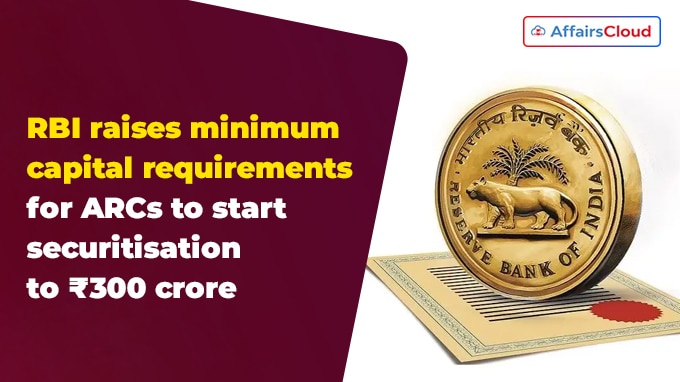 The Reserve Bank of India (RBI) issued Master Direction – Reserve Bank of India (Asset Reconstruction Companies) Directions, 2024 in exercise of its powers conferred by Sections 3, 9, 10, 12 and 12A of the Securitisation and Reconstruction of Financial Assets and Enforcement of Security Interest (SARFAESI) Act, 2002 (54 of 2002) which came into effect from April 24, 2024.
The Reserve Bank of India (RBI) issued Master Direction – Reserve Bank of India (Asset Reconstruction Companies) Directions, 2024 in exercise of its powers conferred by Sections 3, 9, 10, 12 and 12A of the Securitisation and Reconstruction of Financial Assets and Enforcement of Security Interest (SARFAESI) Act, 2002 (54 of 2002) which came into effect from April 24, 2024.
- Under this, RBI raised the Minimum Capital Requirement for ARCs from Rs 100 crore to Rs 300 crore.
- RBI issued this Master Direction to regulate ARCs for investor protection and efficient functioning.
Applicability:
The provisions of these Directions apply to every ARC registered with the RBI under Section 3 of SARFAESI Act, 2002.
Highlights:
i.ARCs, in existence since October 11, 2022, have been granted a transition period to achieve the revised minimum Net Owned Fund (NOF) requirement.
ii.As per the directions, ARCs by March 31, 2024, to reach a minimum NOF of Rs 200 crore, and Rs 300 crore by March 31, 2026.
- Failure to comply will result in supervisory action, potentially restricting further business activities until the required NOF levels are met.
iii.As per the provision of Section 10(2) of the SARFAESI Act, 2002, ARCs with a minimum NOF of Rs 1,000 crore will be eligible to act as Resolution Applicants under Insolvency and Bankruptcy Code (IBC), 2016 of India.
- A resolution applicant refers to any individual or entity willing to submit a plan to address a company’s financial issues during insolvency proceedings.
- It allows ARCs to restructure acquired loans to recover dues through government securities and deposits with designated financial entities like scheduled commercial banks, Small Industries Development Bank of India (SIDBI), and National Bank for Agriculture and Rural Development (NABARD).
iv.Now, ARCs can also invest in short-term instruments like money market mutual funds, certificates of deposit, and corporate bonds/commercial papers with a rating of AA or higher by an eligible credit rating agency (CRA).
- However, these investments are capped at 10% of the ARC’s NOF.
Key Points:
i.Every ARC must maintain a capital adequacy ratio of at least 15% of its total risk-weighted assets.
ii.Before starting securitisation or asset reconstruction operations, an ARC must apply for registration and obtain a Certificate of Registration (CoR) from the Reserve Bank under Section 3 of the SARFAESI Act.
iii.An ARC must commence operations within six months of receiving the CoR. RBI may grant an extension of up to twelve months upon application from the ARC.
iv.Sections 45-IA, 45-IB, and 45-IC of the RBI Act, 1934, do not apply to an ARC registered with the Reserve Bank under Section 3 of the SARFAESI Act.
v.Within ninety days of receiving the CoR, every ARC must develop a Board-approved financial asset acquisition policy.
vi.The ARC should also establish a policy for financial asset realization, ensuring that the realization period does not exceed 5 years from the acquisition date.
vii.ARCs need RBI approval for the appointment/reappointment of Directors, Managing Directors (MDs), or Chief Executive Officers (CEOs).
RBI Deputy Governor T. Rabi Sankar Granted One-Year Extension
The Appointments Committee of the Cabinet (ACC) has re-appointed T. Rabi Sankar as Deputy Governor of RBI for a period of one year w.e.f. May 03, 2024, or until further orders, whichever is earlier.
- The order for the same was issued by the Department of Personnel & Training under Ministry of Personnel, Public Grievances and Pensions (MoPP&P).
About T. Rabi Sankar:
i.He was elevated as from Executive Director to RBI’s Deputy Governor in May 2021 for a period of three years.
ii.He has been holding charge of the central security cell, and the departments of currency management, foreign exchange, internal debt management, information technology, payment and settlement systems, external investments and operations, and government and bank accounts, amongst others.
iii.He was the member of the Board of Directors, Reserve Bank Information Technology Private Limited (ReBIT); and member of the Governing Council, Institute for Development and Research in Banking Technology (IDRBT).
iv.Rabi Sankar has served as an International Monetary Fund (IMF) Consultant (2005-11) on developing Government bond markets and debt management.
Note:
RBI has four Deputy Governors. The other 3 are – Michael Debabrata Patra (MD) Patra; M Rajeshwar Rao; and Swaminathan Janakiraman (J).
RBI imposes Rs 10 Lakh Monetary Penalty on NABFINS for Non-Compliance
RBI in exercise of its powers conferred on RBI under the provisions of clause (b) of sub-section (1) of section 58 G read with clause (aa) of sub-section (5) of section 58 B of the RBI Act 1934 imposed a monetary penalty of Rs 10 Lakh on NABFINS Limited, Bengaluru, Karnataka which is a subsidiary of National Bank for Agriculture and Rural Development (NABARD).
- NABFINS Limited was non-compliant with certain provisions of the Non-Banking Financial Company (NBFC) – Systemically Important Non-Deposit taking Company and Deposit taking Company (Reserve Bank) Directions, 2016.
- However, this penalty will not affect any transaction or agreement entered into by the company with its customers.
Reason:
RBI conducted a statutory inspection of the company’s financial position as of March 31, 2022. After finding non-compliance with RBI directions, the company was issued a notice to explain why penalties shouldn’t be imposed. Following the company’s response, RBI found that the company forced customers to use a specific insurance company for assets financed. This led to a monetary penalty by RBI.
Recent Related News:
i.In January 2024, ACC had extended the tenure of RBI Deputy Governor Michael Patra for a further period of one year, w.e.f. January 15, 2024, or until further orders, whichever is earlier. He is in charge of the all-important monetary policy department and is a member of the rate setting panel.
ii.RBI has issued Guidelines on import of gold by Tariff Rate Quota (TRQ) holders under the India-United Arab Emirates (UAE) Comprehensive Economic Partnership Agreement (CEPA) as notified by the International Financial Services Centres Authority (IFSCA).
About Reserve Bank of India (RBI):
Governor – Shaktikanta Das
Establishment–April 1, 1935
Headquarters– Mumbai, Maharashtra




